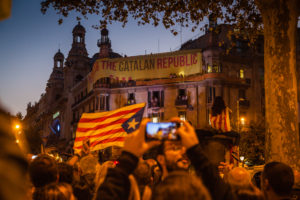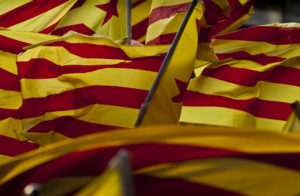The Past and the Present: An In-Depth Look at the Catalan Pro-Independence Movement

Following the recent terrorist attack in Barcelona, Spain is yet again engulfed by another pressing issue that places itself in an impasse. In the beginning of September, Catalonia’s regional government formulated a referendum for its separation from Spain. Since then, it has met with fierce opposition – declaring Catalonia’s referendum as unconstitutional, the central government in Madrid has been determined to crush any seeds yearning for independence. By now, the Spanish police have arrested as many as 14 people including many prominent Catalan high officials, and suspended Catalonia’s ballots through a petition in a Spanish court. As a result, Spain has greatly diminished the Catalan peoples’ chance to vote, but its reckless actions have inevitably incited more anger within the already rebellious region. Unsurprisingly, Catalans throughout the region have protested the unjust treatment Madrid has exerted.
For those who have been closely watching the news, the aforementioned is what various media outlets have relayed. It is true, at best. Nevertheless, it is an incomplete story, for it does not make any reference to Catalonia’s long complicating history with Spain, which is undoubtedly a crucial factor in comprehending the endorsement of Catalonia’s independence. To truly grasp the situation that is unfolding in the region, it is essential to revert to a few special historical events.

The Hard-Fought Past
Bordered between France and Spain, modern-day Catalonia remains under Spain’s control; a glimpse of its history is enough to explain the livid tension between the two sides. Long before the existence of the Spain people know of today, Catalonia was an autonomous province within the Crown of Aragon. This only changed after the War of Spanish Secession in 1701, in which Catalonia was conquered by the Kingdom of Castile, a kingdom which which later became Spain. Under Spanish rule, many attempts were made to assimilate the Catalans by imposing Spanish language and laws, but they were to no avail. The Catalans were adamant in keeping their culture as well as language.
Then in 1931, after nearly 200 years of annexation, the Generalitat, a name for the national Catalan government, was restored and autonomy was brought back along with it. But this progress was short-lived: the Spanish Civil War broke out merely five years after Catalan independence. Since Catalonia sided with the Republicans, it quickly became one of the primary targets for the Spanish Nationalists. In 1938, with the region being taken over by the Nationalists, any spark of separatism was quickly and forcibly extinguished by the new dictator Francisco Franco, a general for the Nationalists during the civil war. In total, 610,000 people were killed, following which the Catalan culture, language and independence were continuously suppressed to prevent any insurrection.
From the futility of the two wars, it is not too difficult to see differences between Catalonia and the rest of Spain. Catalans have their own historical identity that alienates themselves from those outside the region; in truth, the “Catalan Nation”, as Catalans themselves so often proclaim, has never considered itself a part of Spain. In a sense, the excessive democracy is to be put to blame for such an uncompromising attitude, as it has given too much leeway in Catalan politics to easily fuel nationalism. However, as many will agree, such rhetoric and emphasis on nationalism does not appear in times of prosperity. It does, however, surface during times of disparity.
The Accountable Economy

From the perspective of Spain’s economy, the 2008 economic crisis was the key, as it played a vital role in this new wave of pro-independence movement. The 2008 Financial Crisis shocked the world and seriously undermined the world’s economy. Although, through multiple countries’ efforts, complete economic breakdown was avoided, the damage was severe. Spain was unfortunately not immune to this damage. The crisis led to a dramatic increase in its unemployment, strong economic downturn, and bankruptcies of multiple companies. Being a part of Spain, the crisis also dealt a major blow to Catalonia, resulting in 22% of the economically active population thrown into the jobless rate figure.
The increasing dissatisfaction with Spain’s economy evoked the hidden but unfading nationalism within the Catalans. As early as 2009, there were symbolic referendums on independence being voted upon in over 550 municipalities in Catalonia. Furthermore, in 2010, more than a million people demonstrated in Barcelona for greater autonomy of the Catalonia region. Subsequently, in 2012, thousands gathered in central Barcelona demanding an independent Catalonia. As the years have gone by, there have been substantial increases in the number of people who have participated in the protest for Catalonia’s independence.
A Potential Solution
To be able to deal with the continuously worsening condition in Catalonia, Spain must look at the region through both historical and economic perspectives. To soothe this mass demonstration, it must first respect Catalonia’s distinctive culture and make frequent interactions with it. The major difference that divides the two is their language. To be clear, Catalan, spoken by a population of 9 million primarily in the Catalonia region, is a distinctive language derived from vulgar Latin and not a dialect of Spanish as many might believe. Thus far, although Catalan is used by the Catalans in their everyday life, Spanish is still used in administration as well as in education. As such, Spain could potentially provide Catalonia with greater autonomy in terms of its language if it truly believes that Catalonia is an autonomous region instead of a part of Spain. While it certainly cannot guarantee full independence, Spain shouldn’t rashly declare a de facto state of emergency. Doing so will only aggravate the already existing anger and will only do more harm than good.
In terms of the economy, Spain should find ways to maneuver or create new policies that will, at least in the short-term, benefit Catalonia. Catalonia is a critical contributor to Spain’s economy, accounting for 19 percent of Spain’s GDP. However, Catalonia has greater debt than the its Spanish counterpart. Since 2009, the region’s debt as a proportion of GDP has tripled to more than 35 percent, well above the national average of 24.8 percent. As such, Spain should help alleviate the region’s debt problem and focus more on attracting foreign investments in order to stimulate its economy. Of course, it may not completely solve the issue, but Spain must take that measure into consideration: the consequence of not doing so is that it would be the greatest political failure Spain would ever endure.
Ted is currently majoring in Accounting in the Management faculty. His personal political interest focuses on various regional issues around the world.
Edited by Shivang Mahajan
